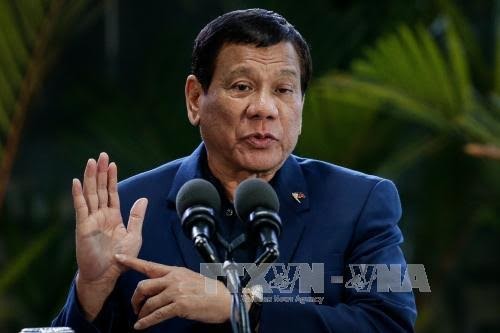(VOVWORLD) - Following clashes between government and rebel forces, Marawi city on Mindanao island, the Philippines, has become the first city in Southeast Asia to come under the control of forces loyal to the IS. With 15% of the world’s 1.57 billion Muslims, Southeast Asia is at risk of becoming the new IS hot spot.
 Filipino President Rodrigo Duterte Filipino President Rodrigo Duterte
|
Violence broke out on May 23rd when the Philippine army attacked the hideout of Isnilon Hapilon, a leader of the Abu Sayyaf terrorist group. More than 100 gunmen pushed back against the army’s attack and mobilized support from other rebel groups. After several hours, the Maute rebel group had gained control of Marawi, a city of 200,000 people, on Mindanao Island, 830 km south of Manila. Philippine President Rodrigo Duterte immediately declared martial law throughout the region.
Terrorists wave IS flag
Maute, one of four extremist groups in the Philippines, has been expanding its operations. Early this year, Maute and other rebel groups, including the Abu Sayyaf group, merged and vowed to become a regional affiliate of the IS. The groups elected a leader and announced the establishment of an Islamic Emirate on the island of Mindanao. These groups waved IS flags and boasted of their weapons and fighting tactics.
In the face of spreading terrorist and extremist groups, kidnapping, and blackmailing, President Duterte has since 2016 threatened to impose martial law. Martial law was imposed on Mindanao on top of the national state of emergency that was imposed last September after a bomb attack in Davao killed14 people. Marawi city, at the moment controlled by 500 rebels, could become the first IS-held city in Southeast Asia.
Terrorists expand their operations
Because IS is losing ground in the Middle East, Southeast Asia is becoming the new center of recruitment. Muslims constitute the majority of the population in Malaysia, the Philippines, and Indonesia.
Thousands of extremists in these countries have, via the internet, sworn loyalty to IS. IS recently posted a video in Bahasa Malay, Tagalog, and English calling on its loyalists to contact IS members in Southeast Asia. An estimated 700 Indonesians and 100 Malaysians have already joined IS in the Middle East, and the IS has been linked by officials to a number of recent attacks in Southeast Asia.